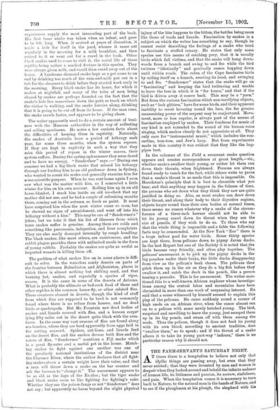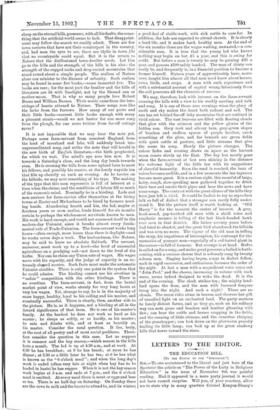THE FARM-SERVANT'S SATURDAY NIGHT.
AT times there is a temptation to believe not only that idyllic things are passing away, but even that they never existed ; that they were invented by men and women in despair when they looked around and beheld the infinite sadness of human life, its littleness and passion, its sorrow, sinfulness, and pain. When the temptation comes it is necessary to turn back to Nature, to the natural man in the bands of Nature, and to see if the ploughman at his plough, the shepherd with hia
sheep on the eternal hills, possesses, with all his faults, the some- thing that the artificial world seems to lack. That disappoint- ment may follow the search we readily admit. There are few town sorrows that have not their counterpart in the country, and, had men the eyes to see, there are idylls in town ,life that no countryside could equal. But it is the return to Nature that the disillusioned town-dweller needs. Let him go to the hills and the strength of the hills is his also : the strength of the rugged rocks and deep-rooted mountains that stand round about a simple people. The realism of Nature alone can minister to the diseases of urbanity. Such realism may be found in some few books,—some immortal few. The books are rare; for the most part the heather and the hills of literature are lit with limelight, not by the blessed sun or mother-mcon. That is why so many people love Robert Burns and William Barnes. Their music came from the lute- strings of hearts attuned to Nature. Their songs rose like the larks from the furrows. How many of our poets and their little books—earnest little books enough with many a pleasant strain—would we not barter for one more song from the plough, for one more twitter from far-off cottage eaves ?
It is not impossible that we may hear the note yet. Perhaps some farm-servant from remotest England, from the land of moorland and lake, will suddenly break into unpremeditated song, and strike the note that will herald in the new birth of English literature,—the birth prophesied, for which we wait. The mind's eye sees him now. It is towards a Saturday's close, and the long day bends towards even. He is crossing the hills from some upland farm to meet his fellows, and possibly his master, at the lonely wayside inn that fills up cheerily on such an evening. As he tarries on the hillside, we may note something of his type. The making of the type that this man represents is full of interest at a time when the claims and the conditions of labour fill so much of the economic mind. Nominally he is a hireling. Lads and men anxious for farm-service offer themselves at the hiring towns at Easter and Michaelmas to be hired by farmers need- ing hands. Abandoning hearth and kin, the lad, maybe at fourteen years or even earlier, binds himself for six months certain to perhaps the wholesomest servitude known to man. His work is hard enough, and would not commend itself to the modern-day Unionist, since it breaks almost every funda- mental rule of Trade-Unionism. • The farm-servant works long hours—often enough, more hours than there is daylight—and he works seven days a week. The husbandman, like Nature, may be said to know no absolute Sabbath. The servant, moreover, must work up to a level—the level of successful agriculture on a grudging soil—not down to the level of the loafer. Nor can be claim any Union rate of wages. His wages move with his capacity, and the judge of capacity is an ex- tremely shapwd master. Such facts must make the automatic Unionist shudder. There is only one point in the system that he could admire. The hireling cannot use his overtime in " unfair " competition with the other hirelings. There is no overtime. The farm-servant, in fact, from the brutal market point of view, works sternly for very long hours at very low wages. Yet, strange to say, he is in the majority of cases happy, healthy, loyal to his calling and his master, and eventually successful. There is clearly, then, another side to the picture. He is, as it happens, not a hireling at all in the inward significance of that term. He is one of his master's family. At the hardest he does not work so hard as his master ; he sleeps as softly, or as hardly, as his master ; he eats and drinks with, and at least as heartily as, his master. Consider the meal question. It lies, truly, at the root of all poetry and of most social problems. There- fore consider the question in this case. Let us suppose it is summer and the hay season,—which season in the hills lasts a month. The lad is up at 4.30 a.m., and at work. At 6.30 he has breakfast; at 9 be has lunch; at noon he has dinner; at 3.30 or a little later he has tea ; at 6 he has what is known as the " 6 o'clock meal "; and when the long day's work is ended (often very late at night when bay has to be loaded in haste) he has supper. When it is not the hay season work begins at 5 a.m. and ends at 7 p.m., and the 6 o'clock meal is omitted. At every meal there is meat or eggs and beer or tea. There is no half-day on Saturday. On Sunday there are the cows to milk and the beasts to attend to, and (in winter)
a good deal of stable-work, with sick cattle to care for. In addition, the lads are expected to attend church. It is clearly a hard life, and it makes hard, healthy men. At the end of the six months there are the wages waiting, unwasted,—a con- siderable sum. It is true that the young lad who knows nothing may begin on but £5 a year, and this is owing for outfit. But before a man is twenty he may be gaining £25 a year, and possess £100 safely banked. The man of thirty can easily be, and frequently is, in a financial position to become a farmer himself. Sixteen years of apprenticeship have, more- over, taught him almost all that men need know about horses, cows, birds, and crops. A man with such experience and with a substantial amount of capital wrung laboriously from the soil possesses all the elements of success.
We may, therefore, look with interest on the farm-servant crossing the hills with a view to his weekly meeting and talk and song. It is one of those rare evenings when the glory of earth and sky makes the heart both radiant and sad. The sun has set behind far-off inky mountains that are outlined in vivid colour. The vast heavens are filled with floating clouds that glow with the crimson and the yellow glories of the hidden sun. Grey rock and silvery tarn, grey-green slopes of bracken and endless spaces of purple heather, catch something of the glow, and far beneath are green fields with quiet cattle at pasture, and little streams that give the scene its song. Slowly the picture changes. The colour fades and evening draws on apace as the harvest moon comes slowly up the East. The day has mostly gone when the farm-servant at last sees shining in the distance the welcome light of the little inn with its suggestions of cheerful humanity. Soon the road is reached, the buzz of voices becomes audible, and iu a few moments the inn taproom has one more guest. It is a curious sight, this roomful of large, hairy, rough, slow-speaking men gathered together to drink their beer and smoke their pipes and hear the news and have some songs. The contrast with the great silence of the hills they have just left is vivid. It would be foolish to try to reproduce talk so full of dialect that a stranger can rarely fully under- stand it. But the picture itself is worth looking at. " Old Harry " is for the moment the centre of interest. A grey, hook-nosed, gap-toothed old man with a shrill voice and emphatic manner is telling of the last black-headed hawk ever seen in that district. His father seventy years before had tried to shoot it, and the great bird abandoned the hillside and was seen no more. The vigour of the old man iu telling the story, his impatience of interruption, his contempt for the memories of younger men—especially of a red-haired giant in the corner—is full of humour. But revenge is at hand. Rufus is called on for a song, and under great pressure a ballad is forth- coming, with a curious chorus that is solemnly sung by twenty solemn men. Singing having begun, songs in dialect follow, each in rapid succession, and enthusiasm becomes the order of the night. At last a man with a magnificent voice roars out "John Peel," and the chorus, increasing in volume with each verse, seems indeed designed to wake the dead. It is the end of the evening. The clock strikes ten ; the mighty land- lord opens the door, and the men with loosened tongues troop into the night. And such a night! There are no clouds. The moon rides alone in heaven and showers her gift of unsullied light on an enchanted land. The party scatters to lonely distant farms, and as they go, each on his solitary way can note grass and bracken and heather gleaming with dew ; can hear the cattle and horses cropping in the fields, and the running of little streams, and the ceaseless chirping of the grasshopper ; can look down on the glowworm proudly trailing its little lamp ; can look up at the great shadowy hills that tower toward the stars.























































 Previous page
Previous page